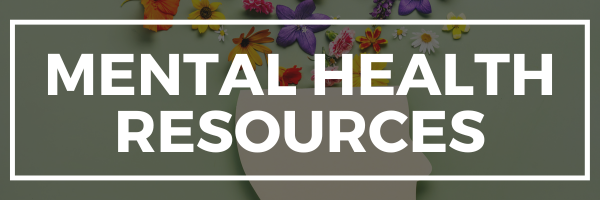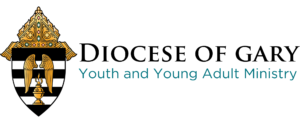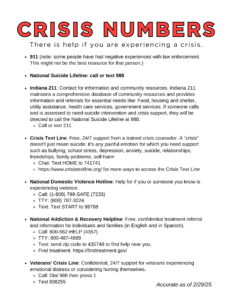
We all know the stats:
- About 50% of adolescents has had a mental health disorder at some point in their lives
- Over 80% of young people have experienced at least one traumatic event by the time they leave high school.
- 25% of teens will experience clinical anxiety or depression
- 1/8 of those teens will get help
- Suicide is the second leading cause of death for individuals between the ages of 10-34, following accidental death
- Those most at risk are:
- Those Experiencing Trauma or Abuse
- LGBTQ+ Youth
- Teens Facing Academic or Peer Pressure
- Those with Chronic Illness or Disabilities
- Individuals from Socioeconomically Disadvantaged Backgrounds
- Substance Use or Addiction
While those stats might seem daunting, we know that young people are more likely to grow in resiliency if they have caring adults who are constant, safe, caring, reliable, and competent. You can be that caring adult in the lives of your young people!
This page just scratches the surface of resources that are available to you. If you are looking for something specific, please do not hesitate to reach out to Vicky Hathaway, Coordinator for Youth and Young Adults at the diocese. She is happy to help! Vicky also has a master’s degree in Clinical Mental Health Counseling from Valparaiso University and has worked as a behavioral therapist for over 7 years. You can reach out to Vicky at [email protected] or by calling 219-769-9292 ext. 229.
Crisis Numbers
- 911 (note: some people have had negative experiences with law enforcement. This might not be the best resource for that person.)
- National Suicide Lifeline: 988
- Indiana 211: Contact for information and community resources. Indiana 211 maintains a comprehensive database of community resources and provides information and referrals for essential needs like: Food, housing and shelter, utility assistance, health care services, government services. If someone calls and is assessed to need suicide intervention and crisis support, they will be directed to call the National Suicide Lifeline at 988.
- Call or text 211
- Crisis Text Line: Free, 24/7 support from a trained crisis counselor.
- Chat: Text HOME to 741741
- National Domestic Violence Hotline: Help for if you or someone you know is experiencing violence.
- Call: (800) 799-SAFE (7233)
- TTY: (800) 787-3224
- Text: Text START to 88788
- Chat online
- National Addiction & Recovery Helpline: Free, confidential treatment referral and information for individuals and families.
- Call: 800-662-HELP (4357)
- TTY: 800-487-4889
- Veterans’ Crisis Line: Confidential, 24/7 support for veterans experiencing emotional distress or considering hurting themselves.
- Call: Dial 988 then press 1
- Text 838255
- Chat online
What to do with these numbers?
- Post them around your worship or fellowship space, like bulletin boards or in the bathroom, so people can see them
- Have them on hand if you receive a phone call from someone in need of crisis support
- Share with staff and volunteers so they know what is available as they minister to others.
Click here for a flyer.
Updated 2/29/25
Trainings for those working with young people
- Mental Health First Aid ($; grants are available in 39 states)
- Understand risk factors and warning signs for common mental health challenges, review typical adolescent development and learn a 5-step mental health action plan to help youth in both crisis and non-crisis situations.
- LivingWorks Start and LivingWorks Faith ($)
- In just 90 minutes online, LivingWorks Start teaches trainees to recognize when someone is thinking about suicide and connect them to help and support. LivingWorks Faith is 5-6 hour online learning program featuring information, simulations, and stories from over a dozen faith leaders and suicide survivors.
- QPR Suicide Gatekeeper training ($)
- Recognize the warning signs of a suicide crisis. Learn how to question, persuade, and refer someone to help. Online or inperson. 1-2 hours
- Talk Saves Lives ($)
- An introduction to Suicide Prevention is a community-based presentation that covers the general scope of suicide, the research on prevention, and what people can do to fight suicide. From the American Foundation for Suicide Prevention.
Tools for those working with young people
- Toolkit for mental health promotion and suicide prevention
- K-12 Toolkit for mental health promotion and suicide prevention
- This Toolkit has drawn on evidence based national and state youth suicide prevention guidelines, including those issued by the Substance Abuse and Mental Health Services Administration (SAMHSA), the American Foundation for Suicide Prevention (AFSP), the Suicide Prevention Resource Center (SPRC),and the states of California and Maine, among others.
- Includes resources for mental health promotion, intervention, and postvention.
- Know the signs suicide prevention website
- On-line tool to help with understanding signs of suicide or crisis
- Mental Health in Parish Ministry by Formed
- When someone is struggling with their mental health, do you know how to minister to them? From the elderly to the youth, families, and singles, wealthy and impoverished, people face more mental health concerns than ever. As a minister, what is your role? What should you do? What is helpful? What is harmful? Sister Josephine Garrett, a licensed Catholic counselor and therapist will provide answers to these questions. Embrace your parishioners, family, self, and colleagues with love, compassion, and truth. You will walk away from this course with a plan of action to best receive God’s people in the most challenging moments of their life.
- Coming Soon: Sanctuary Youth Series
- Their youth resource will be centered on the pressing questions that young people are asking about faith and mental health. It will provide space to engage these questions and start important conversations in youth groups and church communities.
- Going Deeper into Gender and Faith
- From NFCYM: Increasingly, youth ministers are being invited into the lives of young people navigating gender identity questions and emerging gender identity labels. Too often, many feel ill-equipped to engage with young people, stay silent, or reactively respond. This session will offer foundational information to help you more effectively accompany youth who have questions about gender and the intersection of gender with their Catholic faith. This resource is $25
- Responding to Trauma
- From NFCYM: This informative session will equip youth leaders with a clear definition of trauma and practical approaches to help young people navigate difficult times. The webinar will also introduce attendees to Wholehearted, a workbook created by Catholic Charities USA. Wholehearted is designed to support young adults in learning about and coping with trauma in various settings, including small groups, with a mental health professional, or on their own. Join us and gain valuable knowledge to help support the young people in your life! This resource is free for NFCYM Members.
- Whole Hearted
- From Catholic Charities: Whole Hearted is a parish-based trauma-awareness resource that integrates spirituality and religious practices with behavioral health. On the heels of a global pandemic, Whole Hearted can be a powerful resource for communities recovering from trauma. While not intended to be used in place of clinical or professional therapy, Whole Hearted informs participants of trauma’s impact and how one might begin to move forward from it both mentally and spiritually.
- Pastoral Response to Persons with Mental Illness
- This is a bilingual publication (English and Spanish). Leaders of a parish, diocese, or other Catholic organizations can learn the signs of mental illness and reach out to those living with the illness. One in four families will at some time have to cope with mental illness and its effects on a loved one and the family unit. The stigma attached to mental illness forces many to hide the severity of their symptoms or those of a loved one. Many stop coming to church due to the stigma. People can and do recover from mental illness. Recovery can be thought of as a table with four legs. All four legs must be whole, strong, and firmly attached for recovery to take hold. This depends on access to help that includes the four legs of recovery. This booklet identifies the four legs of recovery, where to find the resources for those legs, and when and where to reach out for more help.
Tools for Youth
- Crisis Text Line
- A free, 24/7 support for those in crisis, connecting people in crisis to trained crisis counselors. Text “hello” to 741741
- A “crisis” doesn’t just mean suicide: it’s any painful emotion for which you need support
- bullying, school stress, depression, anxiety, suicide, relationships, friendships, family problems, self-harm
- GritX.org
- Free online intervention to increase student resiliency. Provides adolescents and young adults with the very highest levels of mental health care, so they can become their very finest selves, with a deep love of life and an abiding connection to others and the world around them.
Other Websites
- USCCB National Catholic Mental Health Campaign
- The Association of Catholic Mental Health Ministers
- The National Catholic Partnership on Disability
- Fait Program on Faith and Mental Health: McGrath Institute for Church Life, Notre Dame
- Substance Abuse and Mental Health Services Administration (SAMHSA)
- Be Well Indiana
- National Federation for Catholic Youth Ministry (NFCYM)’s Library of Mental Health Resources
- Topics are
- Stress, Anxiety, and Depression
- Suicide Prevention
- Cutting and Self-Injury
- Substance Abuse
- Other general resources
- Topics are

